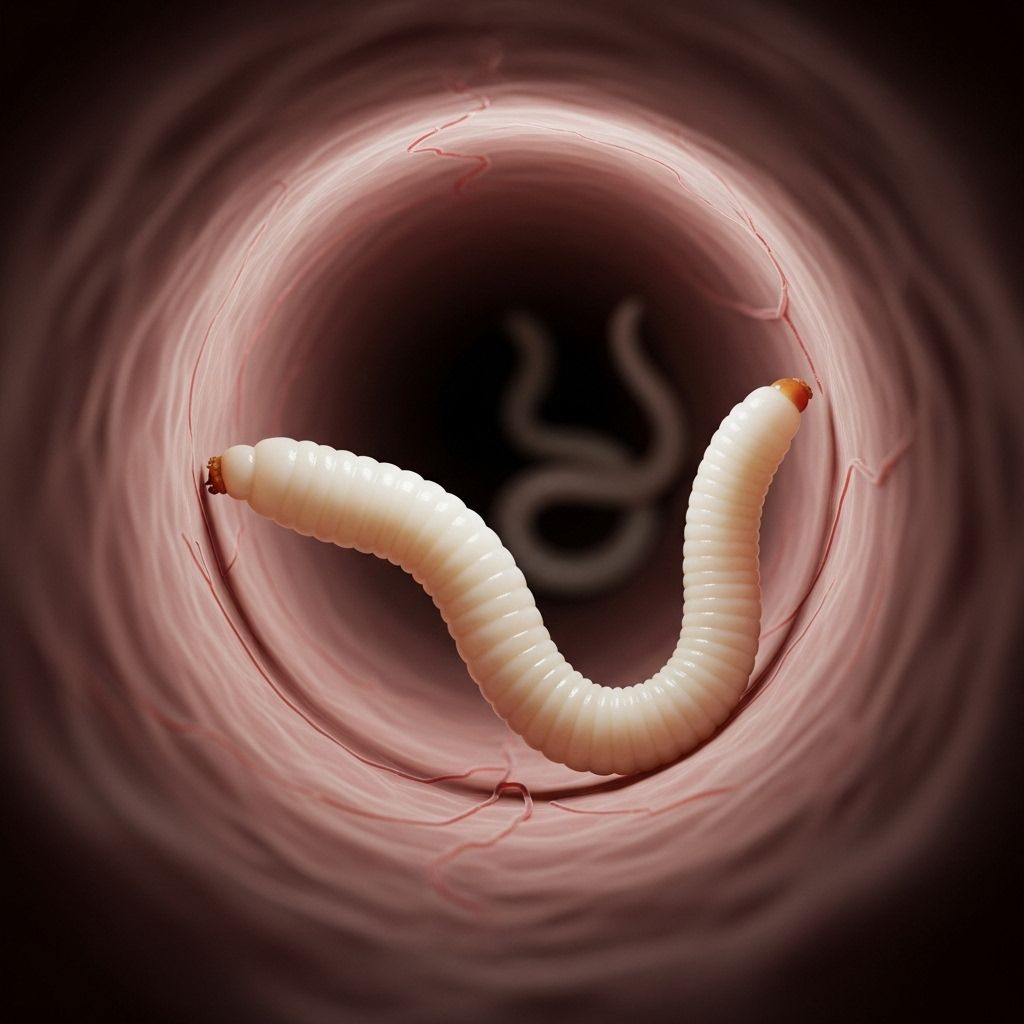Roundworms in Cats: Symptoms, Risks, Treatment, and Prevention
Protect your cat’s wellbeing by understanding, identifying, and preventing dangerous roundworm infections.

Roundworms are among the most widespread intestinal parasites affecting cats. Understanding how these parasites impact your cat’s health, their risk to humans, and how to effectively prevent and treat them is essential for providing a healthy environment for your feline companion and your household.
What Are Roundworms?
Roundworms, medically known as Toxocara cati and less commonly Toxascaris leonina, are parasitic nematodes that live in the intestines of cats, consuming nutrients from their host. They are white to pale brown, spaghetti-like worms, sometimes visible in vomit or feces of infected cats.
- Scientific names: Toxocara cati (primary), Toxascaris leonina (less common)
- Shape: Cylindrical, round-bodied worm
- Size: Up to several inches long when mature
How Roundworms Infect Cats
Roundworm infections are common, especially in kittens. Cats become infected through several routes:
- Ingestion of eggs: Eating contaminated soil, water, or food containing microscopic roundworm eggs is the most frequent pathway for infection.
- Transmammary transmission: Kittens can be infected by drinking the milk of an infected mother cat.
- Ingestion of prey: Eating infected rodents or other small animals can introduce larvae into the cat’s body.
- Grooming contaminated environments: Cats may ingest eggs sticking to their fur or paws after walking or lying in contaminated areas.
Life Cycle of the Roundworm
The roundworm life cycle is complex and tailored for rapid spread:
- Eggs passed in feces: Infected cats shed eggs in their stool.
- Eggs become infective: Eggs require 1-3 weeks in the environment to develop into an infective stage.
- Infection: Cats ingest infective eggs directly, or kittens are infected via mother’s milk.
- Larval migration: After hatching in the gut, larvae migrate through tissues (like liver and lungs) before returning to the intestines to mature.
- Egg production: Adult roundworms release eggs into the intestines, passing in feces to restart the cycle.
Are Roundworms Dangerous for Cats?
Roundworms pose greatest risk to kittens, but can impact cats of any age:
- Kittens: Susceptible to stunted growth, malnutrition, life-threatening blockages, and sometimes death if untreated.
- Adult cats: Often show milder symptoms or may be asymptomatic, but heavy infestations can still result in illness or, in rare cases, serious complications.
Common Clinical Signs
| Kittens | Adult Cats |
|---|---|
|
|
Sometimes, roundworms are visible as long, spaghetti-like worms in feces or vomit.
Diagnosing Roundworm Infection
Your veterinarian will usually confirm roundworm infection with a fecal examination, called fecal flotation:
- Microscopic exam: Veterinarians examine a small stool sample under the microscope to detect the distinctive eggs.
- PCR testing: In some cases, a molecular test may identify parasite DNA, even before eggs are visible.
- Visible worms: In heavy infections, you might see adult roundworms in vomit or feces without needing lab diagnosis.
Sometimes more than one fecal examination is required for confirmation, especially if infection is suspected but initial results are negative, as eggs aren’t always continuously shed.
Treatment Options for Roundworms in Cats
Fortunately, roundworm infections are readily treatable. The mainstay of treatment is a deworming medication called an anthelmintic:
- Multiple doses: Dewormers are typically given in two or more doses several weeks apart to target different stages in the roundworm’s life cycle.
- Medication types: Pyrantel pamoate, fenbendazole, milbemycin, and other veterinary-approved products are commonly used.
- Kitten protocol: Deworming typically starts between 2-4 weeks old and repeats every 2 weeks until the kitten begins broad-coverage parasite prevention.
- Verification: Your vet will recommend follow-up fecal exams after treatment to ensure the infection has cleared.
During and after treatment, you might see dead or live worms in your cat’s feces. This is normal and shows the medication is working.
Sanitation During and After Treatment
Proper hygiene is crucial to prevent reinfection and the spread of parasites to people and other pets:
- Completely empty and wash the litter box with warm, soapy water, then disinfect with a diluted bleach solution.
- Refill the box with clean litter and scoop at least once a day.
- Dispose of feces promptly to reduce environmental contamination.
- Wash hands after handling the litter box or contaminated objects.
If you are pregnant or immunocompromised, avoid cleaning litter boxes or wear gloves and wash hands thoroughly afterward.
Prevention of Roundworm Infections
Proactive prevention is the most effective strategy to protect your cat and household:
- Start deworming kittens as early as possible (by 2-3 weeks of age).
- Repeat deworming every 2 weeks until 8-12 weeks old, then monthly until 6 months old.
- Treat nursing queens along with their litters to reduce risk of transmission.
- Adopt a year-round parasite prevention program for all cats, especially those who go outdoors or hunt.
- Conduct routine fecal exams (4 times in kitten’s first year, then every 6-12 months as an adult).
- Control environmental contamination by prompt removal of feces from litter boxes and outdoor areas.
- Keep your cat indoors to reduce rodent and small mammal hunting.
Consult your veterinarian for the most appropriate deworming and prevention schedule for your cat.
Are Roundworms Zoonotic? Can Humans Catch Them?
Yes, roundworms are considered zoonotic, meaning they can infect humans. People become exposed mainly through accidental ingestion of microscopic eggs from contaminated hands, soil, or objects.
- Children are especially at risk due to play activities in contaminated environments (e.g., sandboxes, soil).
- Immunocompromised individuals (pregnant women, the elderly) also face higher health risks.
Most human cases are asymptomatic, but some can cause serious diseases like visceral or ocular larva migrans if roundworm larvae migrate beyond the intestines, including into the eyes or internal organs, potentially resulting in blindness (rare).
Key prevention tips for humans:
- Practice careful litter box hygiene; scoop daily and clean boxes frequently.
- Wash hands thoroughly after handling cat feces, soil, or sandboxes.
- Teach children proper handwashing and discourage eating dirt or playing in outdoor areas frequented by animals.
Prognosis and Long-Term Management
With prompt diagnosis and effective treatment, the prognosis for roundworm infection is excellent in most cats. Severely infected kittens require urgent veterinary care, as delays greatly increase risk of death or lasting complications.
Routine veterinary care is essential. Regular fecal examinations and year-round parasite control remain the most effective defense against roundworms and other intestinal parasites.
Frequently Asked Questions (FAQs)
Q: How do I know if my cat has roundworms?
A: While some cats show no visible signs, common symptoms include a pot-bellied appearance, vomiting, diarrhea, dull coat, or visible long worms in feces or vomit. A fecal examination by a veterinarian provides a definitive diagnosis.
Q: Are roundworms in cats dangerous to people?
A: Yes, humans can become infected through accidental ingestion of roundworm eggs from contaminated soil or litter boxes. Immune-compromised individuals and children are at higher risk. Practicing good hygiene and litter box maintenance helps prevent infection.
Q: How are roundworms treated in cats?
A: Roundworm infections are treated using deworming medications prescribed by a veterinarian. Multiple doses are often required to address all life stages of the parasite, with follow-up fecal tests to confirm clearance.
Q: Can I prevent my cat from getting roundworms?
A: Yes. Early and routine deworming, year-round parasite preventive medications, regular fecal checks, and good litter box hygiene dramatically reduce the risk of infection.
Q: What should I do if I see worms in my cat’s stool?
A: Contact your veterinarian immediately for diagnosis and treatment. Do not attempt to use over-the-counter dewormers without professional guidance, as inappropriate dosing may be ineffective or unsafe.
Key Takeaways for Cat Owners
- Roundworms are common intestinal parasites, especially threatening to kittens.
- Symptoms range from mild or absent in adults to severe in young or debilitated cats.
- Effective treatment and prevention protocols are available—consult your veterinarian for the best approach.
- Good sanitation in the home protects both feline and human family members.
- Routine veterinary exams and year-round parasite control are essential to keeping cats healthy.
References and Further Reading
- Consult with your local veterinarian or veterinary hospital for tailored advice and treatment options.
- Review guidelines from organizations such as the American Association of Veterinary Parasitologists (AAVP) and Centers for Disease Control and Prevention (CDC) for public health guidance.
Read full bio of Sneha Tete












